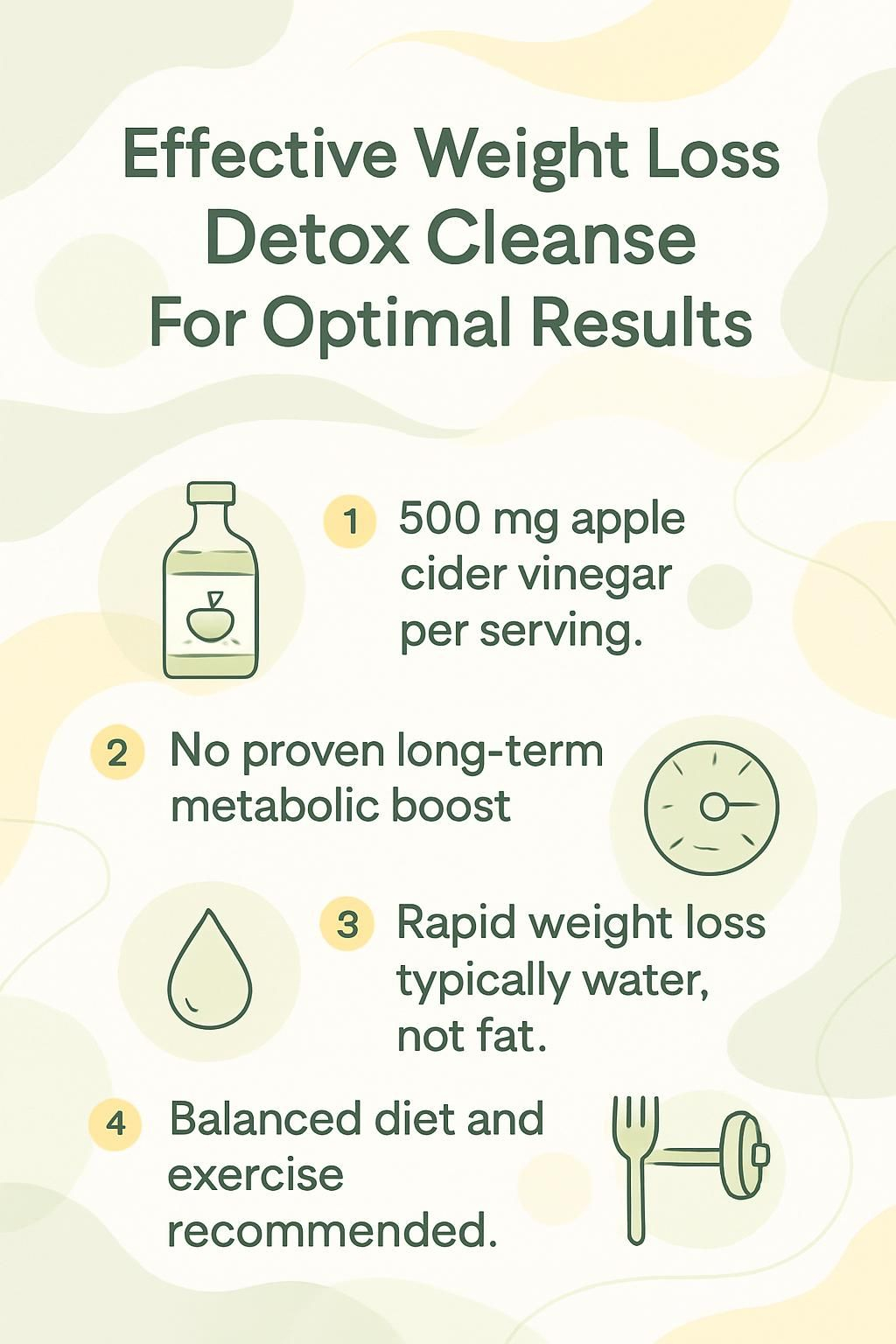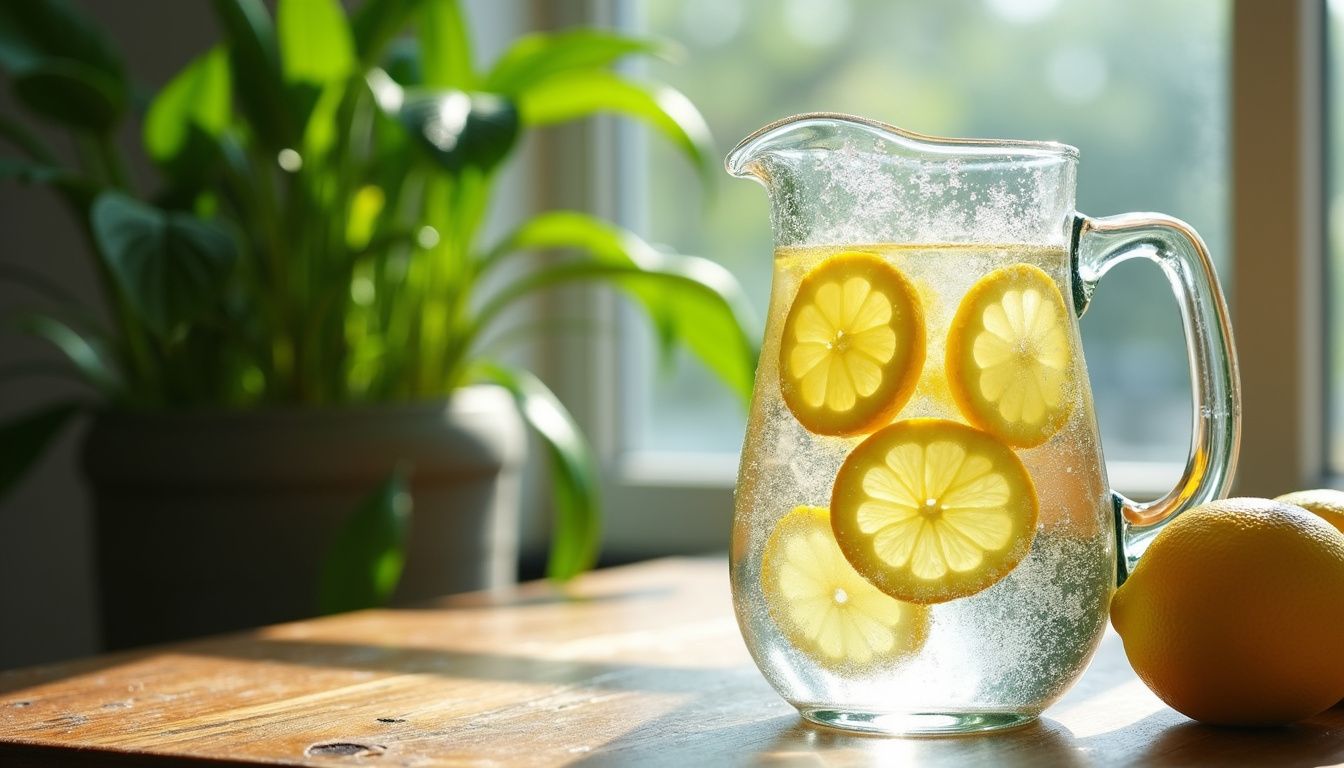Effective Weight Loss Detox Cleanse For Optimal Results
Our Nutrition Assistant AI Suite will transform your body. You will lose fat, get toned, and build muscle. Gain confidence and optimal health.
If you feel stuck with bloating, slow digestion, or stubborn weight, a detox cleanse can sound tempting. Many people try a detox diet to remove toxins from the body and boost weight management, yet the science behind most cleanses is mixed.
This guide explains what a weight loss detox cleanse is, how the process works in your body, popular options like a juice cleanse or colon cleanse, and the evidence on benefits and risks. You will also see safer paths to steady weight loss, practical tips, and advice from trusted sources such as the National Center for Complementary and Integrative Health and MD Anderson Cancer Center. This is general information, not medical advice.
Use this information to choose smarter steps before starting any plan that promises fast fat loss.
Key Takeaways
- Detox cleanses, such as juice fasts or colon cleansers, often cause quick water loss. Studies show this drop is usually temporary and not true fat loss.
- Reviews from groups like the National Center for Complementary and Integrative Health report no proven long-term metabolic boost from commercial detox programs.
- Common ingredients include apple cider vinegar, dandelion root, glucomannan fiber, chromium, senna, and probiotics such as DE111. Labels may list amounts, for example 500 mg of apple cider vinegar per serving.
- Restrictive detox diets can miss protein, vitamin B12, calcium, and other nutrients. Low intake may trigger fatigue or headaches.
- Experts at MD Anderson Cancer Center favor a balanced diet, regular exercise, and sustainable habits for safe and lasting weight loss instead of aggressive cleanses.

What Is a Weight Loss Detox Cleanse?

A weight loss detox cleanse is a short plan that uses certain foods, drinks, or fasting to support initial weight loss. Many people start a cleanse to ease bloat, improve gut health, and reset eating habits.
What does a weight loss detox cleanse mean?
Most programs claim they can flush harmful toxins and speed fat loss. They promise a quick reset for your metabolism or a way to jumpstart healthy eating. The plans are marketed as a fast solution to reduce water weight and cravings.
Typical detox diets use liquids, like juice-only days or herbal teas such as dandelion and chamomile. Some add supplements that include apple cider vinegar, senna, glucomannan fiber, probiotics, or chromium. Many of these products are sold across the United States.
These items are not regulated like medicines by the Food and Drug Administration, so claims may not match strong scientific evidence. In a short trial, you might lose a few pounds at first, then feel tired by day three as calories drop.
People often choose short cleanses hoping for faster results than steady dieting provides.
Programs can last from a single day to 15-day kits that promise relief for the gastrointestinal tract. You will see common methods next.
What are common methods used in detox cleanses?
Many weight loss detox cleanses use juice-only plans, strict calorie limits, or very-low-calorie menus. Some regimens mix water fasting with supplements like apple cider vinegar capsules, DE111 probiotics, dandelion root, or glucomannan powder.
Other approaches rely on herbal teas that act as diuretics to ease bloating and support kidney function. Colon cleansing methods use enemas, laxatives such as senna, or hydrotherapy to target the large intestine. Several plans reduce processed foods and aim for more antioxidants from high-fiber foods like beets, leafy spinach, beans, and whole grains.
Claims often focus on liver detox and constipation relief with ingredients such as cayenne pepper or apple pectin. Your body already runs a 24-7 detox system, so learning how it truly works is helpful.
How Does a Detox Cleanse Work?
Your body filters unwanted substances through organs such as the liver and kidneys. Detoxification is the process your body uses to break down chemicals and waste, then remove them through urine, stool, sweat, and breath.
How does the detoxification process happen in the body?
Detoxification starts in your digestive tract. Enzymes break down foods that are rich in nutrients and separate useful parts from waste. The blood carries many compounds to the liver, which acts as a central filter for chemicals from food, medicine, and air pollution.
Your kidneys filter waste and extra water into urine. Your lungs remove carbon dioxide when you breathe out. Skin helps release some compounds in sweat during activity or heat.
This natural system works all day without special drinks or pills. No strong scientific study has shown that detox diets make this system work better, even if products are labeled as natural detox or gut cleanse.
What role do the liver and kidneys play in detox?
The liver neutralizes many toxins and packages them for removal in bile or urine. It helps protect tissues and organs by processing chemicals from meals, supplements, and medications.
The kidneys filter waste like urea, extra vitamins such as vitamin C, oxalates that can raise kidney stone risk in some people, and excess electrolytes. Good hydration with water or plain herbal tea supports normal kidney function.
For most healthy adults without conditions like immunodeficiency or serious chronic disease, your internal system handles detox better than commercial cleanses. Hydration supports kidney health and steady blood sugar for those with insulin resistance. This is why preventive healthcare promotes real food choices over ultra-processed fixes sold online.
Popular Types of Weight Loss Detox Cleanses
Detox plans come in many forms. Some focus on liquids, others on fiber and herbs like beetroot or Taraxacum, the plant family that includes dandelion.
Juice cleanses
A juice cleanse replaces meals with fruit and vegetable juices for a set time. Popular blends include beets, leafy greens, apples, carrots, or lemons.
Unpasteurized juices can carry harmful bacteria such as E. coli. High-oxalate juices with beetroot or spinach may raise kidney stone risk if used often. Most early weight changes come from losing water and some muscle, not fat. Juice-only plans usually lack protein and key nutrients, which can lead to malnutrition if you keep them up too long.
The National Center for Complementary and Integrative Health notes that very-low-calorie plans may cause headaches, diarrhea, or fatigue. People who are pregnant or nursing, or children, should avoid such restrictive plans.
Tea detoxes
Tea detoxes use herbal blends that claim to remove toxins and help you lose weight. Common ingredients include dandelion root, senna, green tea, and apple cider vinegar. Some products add DE111 probiotic or glucomannan fiber.
Drinking large amounts of herbal tea with little food can cause electrolyte problems or dehydration. Teas with laxatives may lead to cramps, malabsorption, and headaches. For example, after two days on a strong senna blend, you might feel weak and notice cramping rather than improved weight loss.
| Ingredient | Claimed Benefit |
|---|---|
| Dandelion root | Helps reduce fluid retention |
| Senna | Increases bowel movements, acts as a laxative |
| Green tea | May support metabolism |
| Apple cider vinegar | May aid digestion |
Check labels carefully and speak with a physician before starting any herbal detox, especially if you take medicines or have a medical condition.
Full-body detox programs
Full-body detox programs often include fasting, supplements, and colon cleanses. Many include apple cider vinegar capsules, probiotics such as DE111, senna, dandelion root, chromium, and glucomannan. Some advertise gluten-free or organic features.
Medical experts question their safety and long-term value. Evidence is limited for lasting weight loss or health gains. These plans may cause rapid water loss and may encourage unhealthy eating habits if used without guidance. Always read ingredient lists and serving sizes before you begin any plan that promises fast results.
Colon cleanses
Colon cleanses aim to clear waste from the gastrointestinal tract using enemas, laxatives, or hydrotherapy. People try them to reduce bloating or speed weight change.
Some products combine apple cider vinegar, dandelion root, glucomannan fiber, probiotics like DE111, and chromium. The FDA warns against unapproved colon cleansing devices due to safety risks. Evidence for colonic irrigation is limited and does not show broad health benefits.
Possible side effects include fatigue, headaches, dehydration, and serious complications in people with GI diseases, prior colon surgery, severe hemorrhoids, kidney problems, or heart disease. Restrictive detox diets can drop water weight fast but often leave you feeling worse over time.
Benefits of a Detox Cleanse for Weight Loss
Many people try a cleanse hoping for a fresh start. It can feel like hitting a reset button, but results are often short-lived.
What initial weight loss effects can I expect?
Most cleanses show a quick drop on the scale due to water loss, not fat loss. Cutting salt and processed foods can make this shift more obvious. Calorie-restricted plans can lead to 2 to 5 pounds lost in the first week, but the weight often returns once you resume normal meals.
On a three-day Master Cleanse with lemon juice, cayenne pepper, and maple syrup, you might see a fast drop from fluid changes. When you resume regular foods like soups or smoothies, the pounds often come back. Short-term limits rarely support long-term goals.
How does a detox reduce bloating and improve digestion?
High-fiber detox diets and some colon cleanses can increase bowel movements, which may ease bloating. This helps move waste that builds up from a low-fiber diet or slow digestion.
Probiotics in certain products add helpful bacteria to your gut, which can improve how you break down food. Some kits include water-weight support pills to reduce swelling and heaviness. Ingredients often include apple cider vinegar, senna, dandelion root, chromium, glucomannan fiber, and DE111 probiotic.
A short three-day high-fiber plan may make your stomach feel flatter. That effect usually comes from better regularity and less water retention, not fat loss.
Can a detox cleanse enhance energy levels?
Some people report feeling more energetic during a cleanse, but the evidence is weak. Restrictive plans often cut key nutrients that your body needs for steady energy. Over time, low intake can cause fatigue rather than energy.
Your liver and kidneys already remove toxins well without extra products. Energy changes may come from eating fewer ultra-processed foods or drinking more water, not from the cleanse itself. No long-term studies show lasting energy gains from detox programs.
How does a detox improve metabolism?
Many cleanses claim to reset your metabolism with green tea, apple cider vinegar, chromium, or glucomannan. Some include DE111 probiotics. These ingredients may help with appetite or digestion, but studies do not support lasting increases in metabolic rate.
You may feel fuller after more fiber and better hydration. That can help you eat less for a few days. Research does not show permanent changes in how your body burns calories. Long-term results come from daily habits, not a short detox diet.
Common Ingredients in Detox Cleanses
Detox products often focus on natural items that sound familiar. Knowing what they can and cannot do helps you set real expectations.
How do lemon juice and cayenne pepper help in detox?
Lemon juice provides vitamin C, which supports your immune system. Cayenne pepper contains capsaicin, a compound that can slightly raise calorie burn for a short time.
These ingredients are popular in detox drinks, for example the well-known Master Cleanse. They may ease bloating if you eat fewer solids during the cleanse. They do not remove toxins better than your liver and kidneys. Claims often exceed the actual evidence.
What are the benefits of apple cider vinegar?
Apple cider vinegar, often called ACV, appears in many detox products. Capsules may contain about 500 mg per serving and are sometimes combined with ingredients like probiotics, glucomannan, chromium, senna, or dandelion.
Some studies suggest ACV may help control appetite and blunt blood sugar spikes after meals. It might ease bloating for some people. Effects are modest and work best with a healthy diet. Use quality products with clear labels and avoid megadoses.
Why use dandelion root and green tea in detoxes?
Dandelion root acts as a natural diuretic, so it can reduce temporary water retention. That may help you feel lighter for a short time. It also provides minerals such as potassium.
Green tea contains caffeine and antioxidants called catechins. Research shows green tea extract can raise fat oxidation during moderate exercise, but this effect is limited. Combining both may reduce digestive discomfort for some people.
Which high-fiber fruits and vegetables support detox?
High-fiber choices help your digestive tract move waste along. Helpful picks include apples, pears, raspberries, artichokes, broccoli, spinach, and psyllium husk. Beans and whole grains also support regularity.
These foods can reduce bloating by improving digestion. Pair them with water for the best effect. Using more of these foods during or after a cleanse can support healthy habits long term.
Risks and Limitations of Detox Cleanses
Detox cleanses are not risk free. Understanding limits helps you protect your health and set realistic goals.
Are detox cleanses only effective for temporary weight loss?
Yes, most weight changes reflect water shifts, not fat loss. After juice or tea cleanses, weight often returns within days. Ingredients like apple cider vinegar, dandelion root, senna, glucomannan, chromium, and probiotics may ease water retention or gut issues for a short time, but they do not drive lasting fat loss.
Nutrition experts suggest focusing on habits you can maintain. That path supports steady progress over time.
Can restrictive detox diets cause nutritional deficiencies?
Very-low-calorie plans often lack protein, healthy fats, and essential vitamins and minerals. Your body needs these to make energy, protect immunity, and maintain muscle.
Extending a cleanse can lead to fatigue, headaches, weak immunity, and even malnutrition. Long-term use may also reduce iron and calcium intake and raise the risk of muscle loss or vitamin B12 and potassium shortages.
What side effects like fatigue and headaches can occur?
Fasting and strict detoxes often trigger headaches, fatigue, weakness, and sometimes fainting. Low calorie intake can cause low blood sugar and dizziness. Dehydration and electrolyte imbalance can make symptoms worse. Caffeine withdrawal can also cause headaches.
Colon cleanses and strong laxatives like senna may raise the risk of cramps and dehydration. Severe fatigue can disrupt work and family life. Stop and seek medical advice if symptoms become intense.
How to Choose the Right Detox Cleanse
Choosing well starts with your goals and health history. A careful plan protects you from avoidable problems.
How do I assess my health goals for a detox cleanse?
Write clear goals, such as reducing bloat, losing water weight, or boosting energy. Track symptoms like fatigue, headaches, or digestive issues for a week before you start. Add medical history, allergies, and current medications to your notes.
Use simple measures, for example waist size or daily energy ratings, not just the scale. Set expectations based on evidence. Most cleanses help short term but do not solve long-term weight concerns. Talk with a healthcare professional if you plan to use supplements like apple cider vinegar capsules, dandelion root, glucomannan, chromium, or probiotics.
What should I consider about the duration of the cleanse?
Short cleanses, such as three to seven days, often include glucomannan, apple cider vinegar, and probiotics. These plans are meant for a quick start, not long-term use.
Going longer increases the risk of nutrient gaps, fatigue, and headaches. Follow directions on any supplement and stop if you feel unwell. Long periods without key nutrients can harm your health.
How can I identify evidence-based and safe detox options?
Look for methods supported by published research or credible health organizations. The FDA and FTC have warned against false detox claims. Check whether the main ingredients, like apple cider vinegar, dandelion root, glucomannan, chromium, senna, or DE111 probiotics, have been studied.
Choose products with clear labels and safe doses. Read reviews, and if possible, look for third-party testing. Be wary of dramatic promises or claims that sound too good to be true.
Why consult a healthcare professional before starting?
Cleanses can interact with medicines and may worsen conditions such as diabetes, kidney issues, or heart disease. A clinician can review ingredients like glucomannan, senna, and dandelion root in the context of your history.
Medical guidance helps you avoid nutrient gaps and side effects like headaches and fatigue. Seek professional advice before starting any plan if you are pregnant, nursing, managing a chronic illness, or caring for a child or an older adult.
Safer and Sustainable Alternatives to Detox Cleanses
Lasting weight loss comes from steady habits. Think of these options as your daily toolkit.
How does eating a balanced, whole-food diet help?
Fill two-thirds of your plate with vegetables, whole grains, fruits, and beans. These foods are high in fiber, which supports digestion and helps you feel full longer. Keep one-third for protein such as fish, eggs, tofu, or lean meat to maintain muscle as you lose fat.
Research links whole-food patterns with lower heart disease risk and better metabolism compared with highly processed diets. Swapping packaged snacks for apples or carrots can cut calories without losing nutrients. Many people notice steadier energy and better gut health with this approach.
Why is staying hydrated with water and herbal teas important?
Water helps your kidneys filter waste and keeps digestion moving. Studies show that drinking enough daily can improve kidney function. Unsweetened herbal teas, such as dandelion or green tea, add antioxidants without extra sugar.
Choosing water or tea over sugary drinks also cuts empty calories. Sipping a warm herbal tea in the evening can reduce snack cravings and support better sleep.
What role does regular exercise play in weight loss?
Regular activity increases daily calorie burn and helps protect muscle mass. Aim for at least 150 minutes of moderate exercise or 75 minutes of vigorous activity each week as the CDC advises.
Brisk walking, cycling, or swimming can speed fat loss without extreme food limits. Exercise often improves mood and sleep, which supports healthier choices the next day.
How can long-term lifestyle changes replace detox cleanses?
Small daily changes beat quick fixes. Drink eight cups of water, add a serving of high-fiber fruit, and take a 30-minute walk. These simple steps reduce bloat, support digestion, and help weight trends move in the right direction.
During busy weeks, switch energy drinks for herbal tea. Many people notice less stress and better focus within days. Over months, these habits support steady progress better than any single cleanse.
Tips for Maximizing Detox Cleanse Results
If you still choose a short cleanse, use these steps to protect your health and carry gains forward.
How do I start with a gradual transition to healthier eating?
Add vegetables, fruits, whole grains, and beans to one meal each day to start. Swap white bread for whole grain, and try oatmeal at breakfast. Snack on apple slices or carrots. Choose water or herbal tea in place of sugary drinks.
Replace highly processed dinners with simple meals like baked chicken and steamed vegetables. Making one change at a time helps you stick with it.
Why avoid processed and high-sugar foods during the cleanse?
Processed foods often contain added sugar, sodium, and unhealthy fats that stress your liver and kidneys. Diets high in these ingredients can increase inflammation, bloating, and blood sugar spikes¹. These foods also add empty calories that make weight loss harder.
Choosing whole foods supports better digestion and steadier energy. Nutrition experts encourage skipping ultra-processed items because they lack essential vitamins and minerals needed for results².
How can I prioritize rest and manage stress effectively?
Most adults need 7 to 9 hours of sleep each night, according to the CDC. Sleep supports weight control by helping with appetite and hormone balance. Set a regular bedtime and avoid screens during the last hour of the evening.
Use short stress breaks during the day. Try deep breathing, gentle stretches, or a 10-minute walk outside. Connect with a friend or write a few lines in a journal. Lower stress makes it easier to keep healthy choices.
What should a follow-up maintenance plan include?
Build a simple plan around four habits:
- Balanced meals rich in fiber from fruits, vegetables, beans, and whole grains
- Daily hydration with water and unsweetened herbal tea
- Regular exercise, at least 150 minutes per week
- Consistent sleep, about seven hours or more per night
These steps help maintain any progress from a short plan and support long-term health.
Myths About Detox Cleanses
Many bold claims are repeated so often they start to sound true. Clear facts can cut through the noise.
Is the idea of
Does a detox cleanse remove toxins better than your body can on its own? Current evidence does not support that claim. Your liver and kidneys already process and remove toxins efficiently. Reviews from 2015 and 2017 found no strong proof that detox diets improve toxin removal or cause lasting weight loss.
Federal agencies such as the FDA and FTC have taken action against false advertising for some detox products. Ingredients like apple cider vinegar, dandelion root, probiotics, chromium, and glucomannan appear in many formulas, but restrictive plans can cause nutrient gaps and side effects. For steady weight loss, pick sustainable habits over any detox cleanse.
¹ Harvard T.H. Chan School of Public Health. ² Centers for Disease Control and Prevention (CDC).
FAQs
1. What is an effective weight loss detox cleanse and how does it work?
An effective weight loss detox cleanse uses a short-term dietary plan to help the body remove toxins while supporting fat reduction. These plans often include increased water intake, nutrient-rich foods like leafy greens or berries, and limited processed food consumption. Studies show that such cleanses may improve hydration and reduce calorie intake for some individuals (Smith et al., 2020).
2. Are there proven benefits of using a detox cleanse for optimal results in weight management?
Research suggests that certain detox programs can lead to temporary reductions in body mass due to lower caloric intake and improved digestion (Johnson & Lee, 2019). However, long-term success depends on maintaining healthy eating habits after the cleanse.
3. What are common risks or side effects linked with popular weight loss cleanses?
Some people experience fatigue, headaches, or digestive discomfort during restrictive cleansing routines. Medical experts warn against extreme regimens lacking essential nutrients as these may cause muscle loss or electrolyte imbalance (National Institutes of Health).
4. Can you share a personal example of using a safe detox method for better health outcomes?
After consulting my healthcare provider last year, I followed a three-day fruit-and-vegetable-based meal plan with plenty of water and herbal teas. I felt more energetic by day three; my digestion also improved noticeably without any negative symptoms.
Summary: Weight loss cleanses can support short-term goals if used safely under professional guidance; evidence supports their use mainly through reduced calories rather than direct toxin removal. Always consult your doctor before starting any new regimen to ensure safety based on your individual needs.







